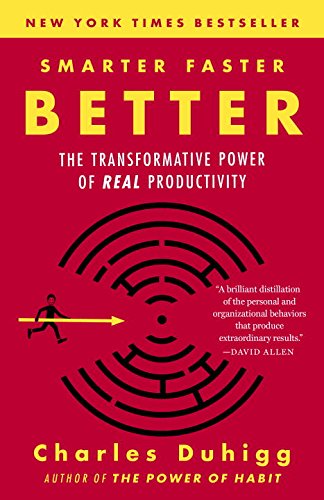
NEW YORK TIMES BESTSELLER • From the author of The Power of Habit comes a fascinating book that explores the science of productivity, and why managing how you think is more important than what you think—with an appendix of real-world lessons to apply to your life.
At the core of Smarter Faster Better are eight key productivity concepts—from motivation and goal setting to focus and decision making—that explain why some people and companies get so much done. Drawing on the latest findings in neuroscience, psychology, and behavioral economics—as well as the experiences of CEOs, educational reformers, four-star generals, FBI agents, airplane pilots, and Broadway songwriters—this painstakingly researched book explains that the most productive people, companies, and organizations don’t merely act differently.
They view the world, and their choices, in profoundly different ways.
A young woman drops out of a PhD program and starts playing poker. By training herself to envision contradictory futures, she learns to anticipate her opponents’ missteps—and becomes one of the most successful players in the world.
A group of data scientists at Google embark on a four-year study of how the best teams function, and find that how a group interacts is more important than who is in the group—a principle, it turns out, that also helps explain why Saturday Night Live became a hit.
A Marine Corps general, faced with low morale among recruits, reimagines boot camp—and discovers that instilling a “bias toward action” can turn even the most directionless teenagers into self-motivating achievers.
The filmmakers behind Disney’s Frozen are nearly out of time and on the brink of catastrophe—until they shake up their team in just the right way, spurring a creative breakthrough that leads to one of the highest-grossing movies of all time.
What do these people have in common?
They know that productivity relies on making certain choices. The way we frame our daily decisions; the big ambitions we embrace and the easy goals we ignore; the cultures we establish as leaders to drive innovation; the way we interact with data: These are the things that separate the merely busy from the genuinely productive.
In The Power of Habit, Pulitzer Prize–winning journalist Charles Duhigg explained why we do what we do. In Smarter Faster Better, he applies the same relentless curiosity, deep reporting, and rich storytelling to explain how we can improve at the things we do. It’s a groundbreaking exploration of the science of productivity, one that can help anyone learn to succeed with less stress and struggle, and to get more done without sacrificing what we care about most—to become smarter, faster, and better at everything we do.
Praise for Smarter Faster Better
“A pleasure to read . . . Duhigg’s skill as a storyteller makes his book so engaging to read.”—The New York Times Book Review
“Not only will Smarter Faster Better make you more efficient if you heed its tips, it will also save you the effort of reading many productivity books dedicated to the ideas inside.”—Bloomberg Businessweek
“Duhigg pairs relatable anecdotes with the research behind why some people and businesses are not as efficient as others.”—Chicago Tribune
“The book covers a lot of ground through meticulous reporting and deft analysis, presenting a wide range of case studies . . . with insights that apply to the rest of us.”—The Wall Street Journal

The book’s good points get buried and forgotten in an epic flood of words A brief warning to busy and smart people: the book contains some interesting insights and pieces of valuable advice. But, in the tradition of most self-help books, its worthwhile points could be communicated in a book 70 to 80 percent shorter. It is just unbelievably tedious with runaway background information and stories. It contains so much superfluous material that it is actually painful to listen to. And the good points get buried and forgotten in a flood of words. I normally prefer…
Mastering what separates “the merely busy from the genuinely productive” Mastering what separates “the merely busy from the genuinely productive”
Too much reliance on anecdote to prove its points Charles Duhigg is a good journalist (his share of a Pulitzer Prize proves that), and his book Smarter Faster Better is a good read. I enjoyed reading it. It’s inspiring and insightful.